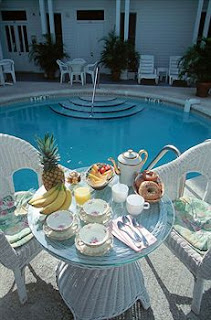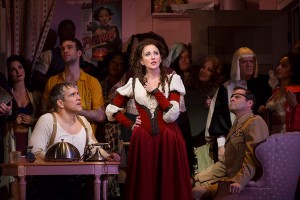Cabaret is a musical with music by John Kander and lyrics by Fred Ebb, based on
John Van Druten's 1951 play I Am a Camera, which was adapted from the
short novel Goodbye to Berlin (1939) by Christopher Isherwood. Set in 1931
Berlin as the Nazis are rising to power, it focuses on the nightlife at the
seedy Kit Kat Klub, and revolves around young American writer Cliff Bradshaw
and his relationship with 32-year-old English cabaret performer Sally Bowles.
A sub-plot
involves the doomed romance between German boarding house owner Fraulein
Schneider and her elderly suitor Herr Schultz, a Jewish fruit vendor.
Overseeing the action is the Master of Ceremonies at the Kit Kat Klub. The club
serves as a metaphor for ominous political developments in late Weimar Germany.
The 1966 original
Broadway production became a hit, inspiring numerous subsequent productions in
London and New York, as well as the 1972 film of the same name.
Act I
At the dawn of
the 1930s in Berlin, the Nazi party is growing stronger. The Kit Kat Klub is a
seedy cabaret, a place of decadent celebration. The Klub's Master of Ceremonies,
or M.C., together with the cabaret girls and waiters, warm up the audience
("Willkommen"). In a train station, Cliff Bradshaw arrives, a young
American writer coming to Berlin to work on his new novel. He meets Ernst
Ludwig, a German who offers Cliff work and recommends a boardinghouse. At the
boardinghouse, Fraulein Schneider offers Cliff a room for one hundred marks; he
can only pay fifty. After a brief debate, she relents and lets Cliff live there
for fifty marks. Fraulein Schneider observes that she has learned to take
whatever life offers ("So What?").
As Cliff visits
the Kit Kat Klub, the Emcee introduces a British singer, Sally, who performs a
racy, flirtatious number ("Don't Tell Mama"). Afterward, she asks
Cliff to recite poetry for her; he recites "Casey at the Bat". Cliff
offers to take Sally home, but she says that her boyfriend Max, the club's
owner, is too jealous. Sally performs her final number at the Kit Kat Club
aided by the female ensemble ("Mein Herr"). The cabaret ensemble
performs a song and dance, calling each other on inter-table phones and
inviting each other for dances and drinks ("The Telephone Song").
The next day,
Cliff has just finished giving Ernst an English lesson when Sally arrives. Max
has fired her and thrown her out, and now she has no place to live, and so she
asks him if she can live in his room. At first he resists, but she convinces
him (and Fraulein Schneider) to take her in ("Perfectly Marvelous").
The Emcee and two female companions sing a song ("Two Ladies") that
comments on Cliff and Sally's unusual living conditions. Herr Schultz, an
elderly Jewish fruit-shop owner who lives in her boardinghouse, has given Fraulein
Schneider a pineapple as a gift ("It Couldn't Please Me More"). In
the Kit Kat Klub, a young waiter starts to sing a song—a patriotic anthem to
the Fatherland that slowly descends into a darker, Nazi-inspired marching song—becoming
the strident "Tomorrow Belongs to Me". He initially sings a
cappella, before the customers and the band join in. (In the 1998 and 2014
revivals, this is replaced by the Emcee playing a recording of a boy soprano).
Months later,
Cliff and Sally are still living together and have fallen in love. Cliff knows
that he is in a "dream," but he enjoys living with Sally too much to
come to his senses ("Why Should I Wake Up?"). Sally reveals that she
is pregnant, but she does not know the father and reluctantly decides to get an
abortion. Cliff reminds her that it could be his child, and seems to convince
her to have the baby. Ernst enters and offers Cliff a job—picking up a suitcase
in Paris and delivering it to his "client" in Berlin—easy money. The
Emcee comments on this "Sitting Pretty", or (in later versions)
"Money".
Meanwhile, Fraulein
Schneider has caught one of her boarders, Fraulein Kost, bringing sailors into
her room. Fraulein Schneider forbids her from doing it again, but Fraulein Kost
threatens to leave. She also mentions that she has seen Fraulein Schneider with
Herr Schultz in her room. Herr Schultz saves Fräulein Schneider's reputation by
telling Fraulein Kost that he and Fraulein Schneider are to be married in three
weeks. After Fraulein Kost leaves, Fraulein Schneider thanks Herr Schultz for
lying to Fraulein Kost. Herr Schultz says that he was serious and proposes to Fraulein
Schneider ("Married").
At Fraulein Schneider
and Herr Schultz's engagement party, Cliff arrives and delivers the suitcase to
Ernst. A "tipsy" Herr Schultz sings "Meeskite" (Meeskite,
he explains, is Yiddish for ugly or funny-looking), a song with a moral
("Anyone responsible for loveliness, large or small/Is not a meeskite at
all"). Afterward, looking for revenge on Fraulein Schneider, Fraulein Kost
tells Ernst, who now sports a Nazi armband, that Schultz is a Jew. Ernst warns Fraulein
Schneider that marrying a Jew may not be wise. Fraulein Kost and company
reprise "Tomorrow Belongs to Me", with more overtly Nazi overtones,
as Cliff, Sally, Fraulein Schneider, Herr Schultz and the Emcee look on.
Act II
The cabaret
girls, along with the Emcee in drag, perform a kick line routine which
eventually becomes a goose-step. Fraulein Schneider expresses her concerns
about her union to Herr Schultz, who assures her that everything will be all
right ("Married" (Reprise)). They are interrupted by the crash of a
brick being thrown through the window of Herr Schultz's fruit shop. Schultz
tries to reassure her that it is just children making trouble, but Fraulein Schneider
is afraid.
Back at the Kit
Kat Klub, the Emcee performs a song-and-dance routine with a girl in a gorilla
suit, singing that their love has been met with universal disapproval ("If
You Could See Her"). Encouraging the audience to be more open-minded, he
defends his ape-woman, concluding with, "if you could see her through my
eyes... she wouldn't look Jewish at all." (The line was intended to shock
the audience and make them consider how easily and unthinkingly they accepted
prejudice, but protests and boycott threats from Jewish leaders in Boston led
Ebb to write an alternate final line, "She isn't a Meeskite at all.” Fraulein
Schneider goes to Cliff and Sally's room and returns their engagement present,
explaining that her marriage has been called off. When Cliff protests, saying
that she cannot just give up this way, she asks him what other choice she has
("What Would You Do?").
Cliff tells Sally
that he is taking her back to America so that they can raise their baby
together. Sally protests, declaring how wonderful their life in Berlin is, and
Cliff sharply tells her to "wake up" and take notice of the growing
unrest around them. Sally retorts that politics have nothing to do with them or
their affairs. Following their argument, Sally returns to the club ("I
Don't Care Much") (in the 1998 Broadway and 2012 London revivals, Sally
takes cocaine before leaving Cliff's room). At the Kit Kat Klub after another
heated argument with Sally, Cliff is accosted by Ernst, who has another
delivery job for him. Cliff tries to brush him off, but when Ernst asks if
Cliff's attitude towards him is because of "that Jew at the party",
Cliff attacks him—only to be badly beaten up by Ernst's Nazi bodyguards and
dragged out of the club. On stage, the Emcee introduces Sally, who enters to
perform again, singing that "life is a cabaret, old chum," cementing
her decision to live in carefree ignorance and freedom ("Cabaret").
The next morning,
the bruised Cliff is packing, when Herr Schultz visits. He tells Cliff that he
is moving to another boardinghouse, but is confident that the bad times will
soon pass. He understands the German people, he says, because he is a German
too. When Sally returns, she reveals that she has had an abortion; Cliff slaps
her. He still hopes that she will join him, but Sally says that she has
"always hated Paris" and hopes that when Cliff finally writes his
novel, he will dedicate it to her. Cliff leaves, heartbroken.
On the train to
Paris, Cliff begins to write his novel, reflecting on his experiences:
"There was a cabaret, and there was a master of ceremonies ... and there
was a city called Berlin, in a country called Germany ... and it was the end of
the world." ("Willkommen" Reprise). In the Kit Kat Klub, the
Emcee welcomes us (in the 1998 revival, he strips off his overcoat to reveal a
concentration camp prisoner's uniform marked with a yellow Star of David and a pink
triangle), and the backdrop raises to reveal white space with the ensemble
standing within. The cabaret ensemble reprises "Willkommen", but it
is now harsh and violent as the Emcee sings, "Auf Wiedersehen...à
bientôt..." followed by a crescendo drum roll and a cymbal crash. Some
productions have the white space then flashing with a strobe effect, implying
the cabaret performers, except for Sally (who is not standing in the white
space), will fall victim to Nazi atrocities towards the Jews.












































